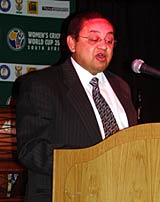'Our administration is a bit overblown'
Too much bureaucracy? Too much cricket? Percy Sonn on the burning questions of the day
|
|

|
I have been lucky to be vice-president under Ehsan Mani. He's been at the forefront of creating this ICC. He was the real builder of this thing, from the time he was chairman of the finance and marketing committee. My job will be to consolidate what he has set in place. Ehsan is a very hands-on president. I'm a hands-off president. I like to be in control too, but I don't think, of necessity, it's a president's job to do the work. That's why you have a chief executive. Some people perceive Ehsan to have become too operational but it's been for the ICC's good. We are a very much better organisation now than when he took over three years ago. We're much more professional, we've got greater interests everywhere, we've got control, we work to budgets.
We face divisions on the political front. There's always the great desire to have power. And there's this huge cake of money. Each director on the ICC board represents a country. These countries have vested interests in each other's performance. We have the ICC events, which we have carved out with the Future Tours Program. But then the individual countries arrange tour programmes bilaterally.
The perception that it is a behemoth is not a good thing. The administration is definitely a bit overblown. Malcolm Speed knows what my views are. The problem is the lack of ability on the national level to manage ICC events. The ICC, of necessity, because it owns these events, has to ensure they take place according to its contracts with its commercial partners.
2011 is not entirely entrenched. We still have to sell [the rights for] that. We have to have commercial partners, who obviously want the best tournament because that generates the most money. A more compact tournament usually creates better competition, but it's a balancing act. You have to understand the geography of Asia, the politics of Asia, and the interest it creates there. I say that a 2011 World Cup in Asia need not be the same as a 2015 one in Australasia or a 2019 one in England.
We've attempted to get the governments - remember we're sitting here with many independent governments - to try and solve this problem. It's supply and demand. They're full already. They've got so little accommodation that they can charge the world. It can diminish the value of the World Cup.
We have sufficient committees to handle these things. We deal with their recommendations. For instance, the cricket committee under Sunny Gavaskar is doing a good job.
We have this huge Chinese market, we have an American market. I've been told by the Zee Television people that after India the biggest viewership of cricket is in America because of the expatriates. We must continue to explore new markets.
Colin Bryden is the author of Return of the Prodigal: South Africa's Cricketing Comeback among other books